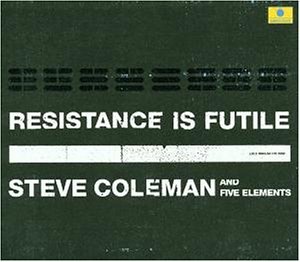
| Artist: | Steve Coleman |
| Title: | Resistance is Futile |
| Released: | 2001.10.16 |
| Label: | Label Bleu |
| Time: | 67:53 / 67:13 |
| Producer(s): | Steve Coleman |
| Appears with: | |
| Category: | Jazz |
| Rating: | *********. (9/10) |
| Media type: | CD |
| Purchase date: | 2001.12.18 |
| Price in €: | 18,99 |
| Web address: | www.m-base.com |